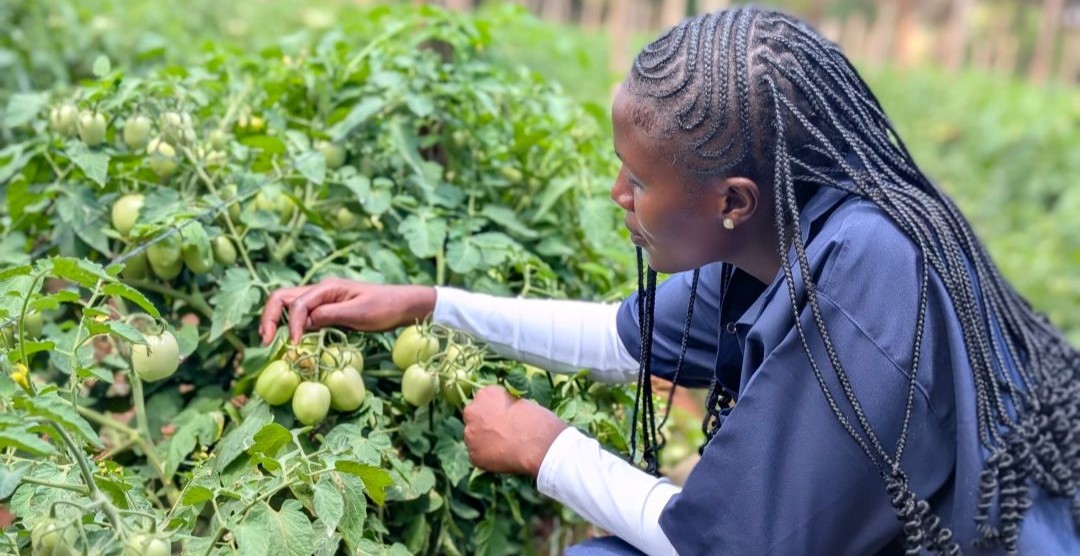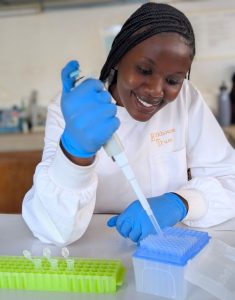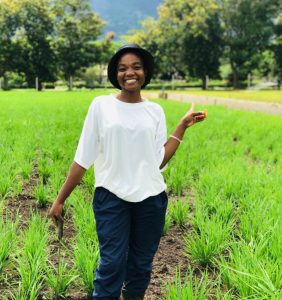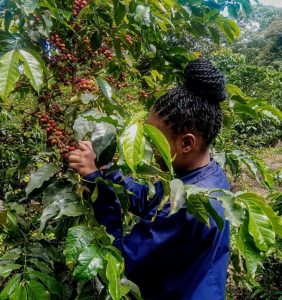I grew up in a farming community where agriculture shaped everyday life. The persistence of my family, most of whom were farmers, guided my academic path. Observing how climatic variability strained their efforts led me to agricultural sciences, particularly crop improvement and agronomy. From early on, I understood that rigorous science can transform traditional practices into sustainable, productive systems that protect livelihoods.
I currently serve as a Tutorial Assistant in Agricultural Botany. This role has deepened my commitment to research drought tolerance in rice because it addresses a central constraint to productivity and a central risk to household income in Africa’s rainfed and irrigated landscapes. My research interest is developing and delivering climate-resilient germplasm and agronomic packages that maintain yield even with scarce water supply, while remaining feasible for smallholders. The approach combines phenotyping for drought tolerance, geospatial targeting for variety placement, and seed system strengthening so that improved options reach both women and men equitably (International Rice Research Institute [IRRI], 2024).
This focus directly supports the Climate-resilient and Eco-friendly Rice for Africa initiative. The project advances resilient and eco-efficient rice systems through evidence-based technologies. My contribution is to connect trait discovery and on-farm validation with delivery science. In practice, this includes co-designing on-farm trials for drought-tolerant lines, linking seasonal advisories to variety of choice and planting windows, and collaborating with local multipliers so that quality seed flows efficiently to priority environments. These steps are consistent with current IRRI efforts that couple stress-tolerant rice with climate-risk mapping and targeted dissemination in Tanzania (IRRI, 2024).
The importance of this problem is evident in my national and local context. Tanzania is among Sub-Saharan Africa’s larger rice producers, with milled output reported at about 2.45 million metric tons in 2023/24 and 2.52 million metric tons projected for 2024/25. Harvested area is approximately 1.10 to 1.13 million hectares and average yields about 3.33 to 3.39 tons per hectare on a rough basis (U.S. Department of Agriculture Foreign Agricultural Service [USDA-FAS], 2025). Despite this scale, production is highly exposed to water risk. Only about 289,386 hectares were irrigated in 2019/20, which represented roughly 2.3 percent of the total planted area nationally (National Bureau of Statistics [NBS] & Office of the Chief Government Statistician [OCGS], 2021). Sector strategies note that more than 70 percent of Tanzania’s rice area is rainfed, which concentrates vulnerability to rainfall variability and dry spells (Ministry of Agriculture, 2021). Over the past three decades, the country has experienced at least six major droughts, underscoring the systemic nature of water shortages (World Bank/CIWA, 2021). These constraints periodically require market management; for example, the Government of Tanzania issued about 150,000 metric tons of rice import quotas in 2024 to stabilize supply (USDA-FAS, 2025). This means that without innovations in climate-resilient rice, food insecurity and economic vulnerability will continue to rise. Addressing this challenge through science-based solutions is, therefore, both a national priority and a personal calling.



 Women represent about 50% of the labor force (World Bank, 2024) in rice farming, particularly in planting, weeding, harvesting, and processing, yet face time, information, and input constraints that shape farmers’ technology adoption outcomes. Recent national statistics and briefs emphasize the need for sex-disaggregated monitoring to guide equitable delivery (National Bureau of Statistics [NBS] & Office of the Chief Government Statistician [OCGS], 2024; Evans School Policy Analysis and Research [EPAR], 2020). Within CERA, I will advocate for women’s active participation in research dissemination and ensure that improved rice varieties reach them equitably. Empowering women with climate-resilient technologies can significantly uplift households and strengthen community resilience.
Women represent about 50% of the labor force (World Bank, 2024) in rice farming, particularly in planting, weeding, harvesting, and processing, yet face time, information, and input constraints that shape farmers’ technology adoption outcomes. Recent national statistics and briefs emphasize the need for sex-disaggregated monitoring to guide equitable delivery (National Bureau of Statistics [NBS] & Office of the Chief Government Statistician [OCGS], 2024; Evans School Policy Analysis and Research [EPAR], 2020). Within CERA, I will advocate for women’s active participation in research dissemination and ensure that improved rice varieties reach them equitably. Empowering women with climate-resilient technologies can significantly uplift households and strengthen community resilience. I grew up in a small district called Maswa, situated in the northern part of Tanzania, south-east of Lake Victoria. I was raised by my mother. She was a nurse but also a smallholder farmer. She cultivated rice and maize at our farm located around our home. Just like other smallholder farmers, my mother faced many challenges, such as unpredictable weather patterns, use of old, traditional varieties, limited access to inputs, and poor local soil knowledge. Growing up with my mother exposed me to the most traditional ways of cultivating rice and the challenges they faced. The whole experience basically drove my desire to one day become an agricultural researcher; hence, I chose to pursue a BSc in Agronomy.
I grew up in a small district called Maswa, situated in the northern part of Tanzania, south-east of Lake Victoria. I was raised by my mother. She was a nurse but also a smallholder farmer. She cultivated rice and maize at our farm located around our home. Just like other smallholder farmers, my mother faced many challenges, such as unpredictable weather patterns, use of old, traditional varieties, limited access to inputs, and poor local soil knowledge. Growing up with my mother exposed me to the most traditional ways of cultivating rice and the challenges they faced. The whole experience basically drove my desire to one day become an agricultural researcher; hence, I chose to pursue a BSc in Agronomy. I expect to enhance my knowledge and skills in climate-smart and eco-friendly rice production, particularly in developing practical solutions for drought-prone areas. I look forward to contributing to scientific innovation through agronomic research and sharing findings that address yield gaps and strengthen resilience in rice systems. I also expect to promote gender equity by ensuring women farmers actively engage in training and decision-making, thereby supporting inclusive development.
I expect to enhance my knowledge and skills in climate-smart and eco-friendly rice production, particularly in developing practical solutions for drought-prone areas. I look forward to contributing to scientific innovation through agronomic research and sharing findings that address yield gaps and strengthen resilience in rice systems. I also expect to promote gender equity by ensuring women farmers actively engage in training and decision-making, thereby supporting inclusive development.